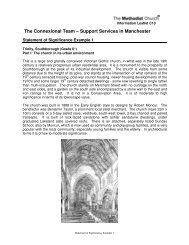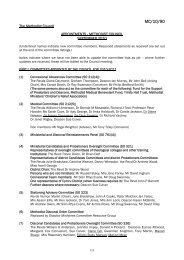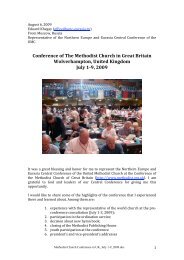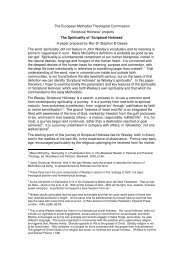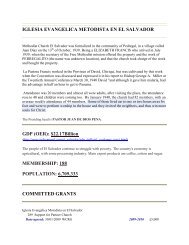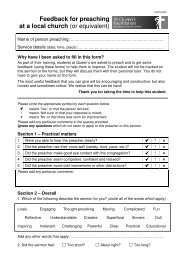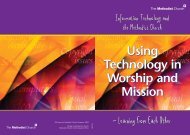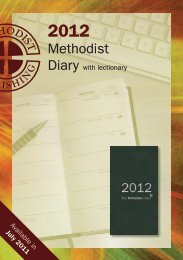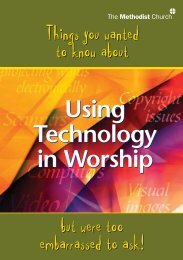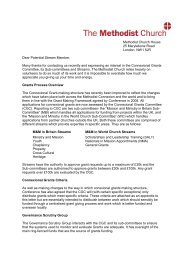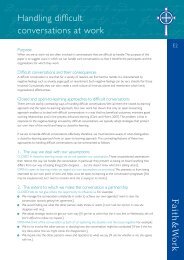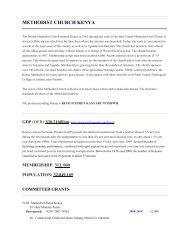Book Two - PDF - The Methodist Church of Great Britain
Book Two - PDF - The Methodist Church of Great Britain
Book Two - PDF - The Methodist Church of Great Britain
You also want an ePaper? Increase the reach of your titles
YUMPU automatically turns print PDFs into web optimized ePapers that Google loves.
A guide to Ministerial Development Review<br />
This ministry will make great demands upon you and upon<br />
those close to you, yet in all this, the Holy Spirit will sustain<br />
you by his grace.<br />
From the ordination services<br />
<strong>The</strong> <strong>Methodist</strong> <strong>Church</strong><br />
<strong>Book</strong> <strong>Two</strong> | <strong>The</strong> focus <strong>of</strong> Ministerial Development Review
Further copies <strong>of</strong> this guide can be provided by contacting:<br />
About this guide<br />
mdr@methodistchurch.org.uk<br />
Ministerial Development Review<br />
<strong>Methodist</strong> <strong>Church</strong> House<br />
25 Marylebone Road<br />
London NW1 5JR<br />
<strong>PDF</strong>s <strong>of</strong> this guide are available from:<br />
www.methodist.org.uk/mdr<br />
Sue Miller, Sheryl Anderson, Paul Taylor and Siôn Rhys Evans<br />
from the Connexional Team can be contacted about Ministerial<br />
Development Review at the above email and postal addresses, and<br />
through the Helpdesk on 020 7486 5502.<br />
This guide is designed for ordained ministers who will be<br />
involved in Ministerial Development Review, as well as for those<br />
wishing to act as lay contributors. It may also be helpful to those<br />
providing administrative support or <strong>of</strong>fering feedback. It <strong>of</strong>fers an<br />
overview <strong>of</strong> Ministerial Development Review, as well as providing<br />
supporting guidance and background material which will help all<br />
participants to get the most out <strong>of</strong> the process.<br />
<strong>Book</strong> One is essential reading. It provides an overview <strong>of</strong> the<br />
principles which form the backdrop to Ministerial Development<br />
Review and <strong>of</strong> the key elements <strong>of</strong> the annual review meeting.<br />
<strong>Book</strong>s <strong>Two</strong> and Three provide important supporting guidance.<br />
<strong>Book</strong> <strong>Two</strong> considers those aspects <strong>of</strong> ministry which may provide<br />
a focus for ongoing reflection as part <strong>of</strong> Ministerial Development<br />
Review, with specific suggestions for deacons, presbyters,<br />
superintendents and district chairs respectively. It also highlights<br />
those areas which should form the focus for the annual review<br />
meeting. <strong>Book</strong> Three provides practical guidance about the<br />
review meeting. It sets out the roles and responsibilities <strong>of</strong> the<br />
participants and outlines the preparation required for the review<br />
meeting, including the gathering and sharing <strong>of</strong> feedback. <strong>The</strong>re<br />
are some suggestions about how to conduct the review meeting,<br />
and how to identify hopes, goals and areas for learning and<br />
development. This book also <strong>of</strong>fers guidance about recording the<br />
key outcomes <strong>of</strong> the review meeting, and includes report templates.<br />
<strong>Book</strong> Four provides background material. It looks at some<br />
<strong>of</strong> the skills and best practice which will support Ministerial<br />
Development Review and help to enable positive experiences for<br />
all participants.
A guide to Ministerial Development Review<br />
“<strong>The</strong>y shall build up the ancient ruins”<br />
“In all this the Holy Spirit will sustain you by his grace”<br />
<strong>Book</strong> <strong>Two</strong> | <strong>The</strong> focus <strong>of</strong> Ministerial Development Review
God has called you into the Order <strong>of</strong> Deacons among his<br />
people.<br />
In his name you are to assist God’s people in worship and prayer;<br />
to hold before them the needs and concerns <strong>of</strong> the world; to<br />
minister Christ’s love and compassion; to visit and support the<br />
sick and the suffering; to seek out the lost and the lonely; and<br />
to help those you serve to <strong>of</strong>fer their lives to God.<br />
Fulfil your calling as disciples <strong>of</strong> Jesus Christ, who came not to<br />
be served but to serve.<br />
In all things give, counsel and encouragement to all whom<br />
Christ entrusts to your care. Pray without ceasing. Work with<br />
joy in the Lord’s service. Let no one suffer hurt through your<br />
neglect.<br />
This ministry will make great demands upon you and upon<br />
those close to you, yet in all this, the Holy Spirit will sustain<br />
you by his grace.<br />
From the ‘Examination’ <strong>of</strong> ordinands during the diaconal<br />
ordination service<br />
God has called you into the Order <strong>of</strong> Presbyters among<br />
his people.<br />
In his name you are to preach by word and deed the Gospel<br />
<strong>of</strong> God’s grace; to declare God’s forgiveness <strong>of</strong> sins to all who<br />
are penitent; to baptize, to confirm and to preside at the<br />
celebration <strong>of</strong> the sacrament <strong>of</strong> Christ’s body and blood; to lead<br />
God’s people in worship, prayer and service; to minister Christ’s<br />
love and compassion; to serve others, in whom you serve the<br />
Lord himself.<br />
<strong>The</strong>se things are your common duty and delight. In them you<br />
are to watch over one another in love.<br />
In all things, give counsel and encouragement to those whom<br />
Christ entrusts to your care. Pray without ceasing. Work with<br />
joy in the Lord’s service. Let no one suffer hurt through your<br />
neglect.<br />
This ministry will make great demands upon you and upon<br />
those close to you, yet in all this, the Holy Spirit will sustain<br />
you by his grace.<br />
From the ‘Examination’ <strong>of</strong> ordinands during the presbyteral<br />
ordination service
Contents<br />
1<br />
5<br />
7<br />
Introduction<br />
Reflective practice<br />
<strong>The</strong> focus for reflection<br />
8<br />
10<br />
12<br />
15<br />
17<br />
18<br />
<strong>The</strong> focus for reflection for deacons<br />
<strong>The</strong> focus for reflection for presbyters<br />
An additional focus for reflection for superintendents<br />
An additional focus for reflection for district chairs<br />
‘Doing’ and ‘being’<br />
<strong>The</strong> local and particular context<br />
19<br />
25<br />
Template | Areas for reflection during<br />
Ministerial Development Review<br />
<strong>The</strong> focus for the review meeting<br />
<strong>Book</strong> <strong>Two</strong> | <strong>The</strong> focus <strong>of</strong> Ministerial Development Review
Introduction<br />
Roderic Gray in his book How people work 3 sets out what he calls<br />
“a catechism <strong>of</strong> excellence” – nine key statements which each <strong>of</strong> us<br />
should be able to make if we are to contribute positively within an<br />
organisation:<br />
I know what I’m expected to do.<br />
I want to do it.<br />
I have the ability to do it.<br />
Processes help me to do it.<br />
I have the resources to do it.<br />
<strong>The</strong> environment is right.<br />
Someone (who matters to me) will notice if I do it.<br />
I know how well I am doing.<br />
I can do it better next time.<br />
3 FT/Prentice Hall, London, 2004<br />
<strong>Book</strong> <strong>Two</strong> | <strong>The</strong> focus <strong>of</strong> Ministerial Development Review 1
Whilst ordained ministry presents special challenges and a<br />
unique focus, the nine key statements <strong>of</strong> Gray’s ‘catechism’ do,<br />
arguably, have application. <strong>The</strong> statements address, at their<br />
core, the familiar and valuable dynamics <strong>of</strong> call, gifting, context<br />
and growth. As we exercise our ministry, we all need to recall<br />
our calling and our gifts, and to know what is required <strong>of</strong> us;<br />
we all need and deserve to be provided with the appropriate<br />
resources and environment in which to fulfil our ministry; and<br />
we all need and deserve to be enabled to grow in God’s service.<br />
<strong>The</strong> affirmation which is also implied within the ‘catechism’ has<br />
relevance: although receiving and sharing in the ministry <strong>of</strong> Christ<br />
is the ultimate motivator for the <strong>Church</strong>’s ministry, celebrating the<br />
triumphs and joys <strong>of</strong> ministry with others can make a significant<br />
difference and provide renewed energy and focus.<br />
Three sets <strong>of</strong> guidance follow. <strong>The</strong> first, Reflective practice,<br />
emphasises the importance <strong>of</strong> reflective practice during<br />
Ministerial Development Review. <strong>The</strong> second, <strong>The</strong> focus for<br />
reflection, suggests areas for ongoing reflection on ministry,<br />
drawn from Conference reports and from an analysis <strong>of</strong> some<br />
<strong>of</strong> the dynamics which shape the practice <strong>of</strong> ministry. <strong>The</strong>se<br />
areas will be helpful for reflection both throughout the year and,<br />
specifically, in preparation for the review meeting. <strong>The</strong> third<br />
section, <strong>The</strong> focus for the review meeting, highlights the key<br />
areas for discussion in the meeting. <strong>The</strong>se discussions will draw<br />
on the insights derived from the minister’s, and others’, reflection<br />
on practice.<br />
Ministerial Development Review encourages ministers to consider<br />
the dynamics <strong>of</strong> call, gifting, context and growth. It also gives<br />
permission to explore the questions which will inevitably arise<br />
from such considerations, and to ask the questions in the company<br />
<strong>of</strong> those who have an understanding <strong>of</strong> the local context and<br />
who have a designated role in providing support and oversight.<br />
Ministerial Development Review’s ultimate objective is holistic<br />
growth. It necessarily involves an annual set <strong>of</strong> processes, but its<br />
continuing background is an ongoing process <strong>of</strong> prayerful and<br />
critical reflection and a sustained commitment to learning and<br />
self-development.<br />
2<br />
Introduction<br />
<strong>Book</strong> <strong>Two</strong> | <strong>The</strong> focus <strong>of</strong> Ministerial Development Review 3
Reflective practice<br />
One <strong>of</strong> the key components <strong>of</strong> Ministerial Development Review<br />
is the process <strong>of</strong> ‘reflecting on practice’ – something which a<br />
minister is encouraged to do on an ongoing basis, both on their<br />
own and in the company <strong>of</strong> others. <strong>The</strong> ‘practice’ in reflective<br />
practice refers to the minister’s ministry, while ‘reflective’ refers<br />
to the thoughtful consideration <strong>of</strong> the experiences and the<br />
situations which the minister faces throughout the year as they<br />
seek to fulfil their ministry. Sometimes the minister may seek<br />
the views <strong>of</strong> others and may form supportive relationships which<br />
will help them in their attempts to unpick and understand their<br />
experiences. Effective reflection, whether on an individual basis<br />
or in the company <strong>of</strong> others, leads to insights and understanding<br />
which can then be applied to future ‘practice’.<br />
This reflection on practice is an important part <strong>of</strong> Ministerial<br />
Development Review: it is expected that each minister will reflect<br />
on their ministry throughout the year, not simply immediately<br />
prior to the review meeting. This habit <strong>of</strong> reflection will yield<br />
insights which will lead to growth and development outside the<br />
review meeting, but it will also add to the information available<br />
to the review meeting discussion. How far the minister chooses<br />
to reveal the full extent <strong>of</strong> their insights will be up to the minister<br />
concerned – but it is hoped that the insights gained from<br />
reflecting on their ministry will inform the minister’s responses<br />
to others’ feedback, and will be a useful source <strong>of</strong> observations<br />
and comment in the review meeting, informing conversation about<br />
aspirations, future hopes, and areas for learning, development<br />
and growth.<br />
For more information, see <strong>Book</strong> Four | Reflective practice<br />
4<br />
<strong>Book</strong> <strong>Two</strong> | <strong>The</strong> focus <strong>of</strong> Ministerial Development Review 5
<strong>The</strong> focus for reflection<br />
6<br />
<strong>Book</strong> <strong>Two</strong> | <strong>The</strong> focus <strong>of</strong> Ministerial Development Review 7
<strong>The</strong> focus for reflection for deacons<br />
<strong>The</strong> Conference report What is a Deacon notes that the ministry<br />
<strong>of</strong> deacons can be characterised as “witness through service”. <strong>The</strong><br />
report goes on to note that this ministry can be expressed in:<br />
• embodied acts <strong>of</strong> pastoral care, mercy and justice, and being or<br />
acting as a prophetic sign<br />
• spoken acts <strong>of</strong> evangelism, apologetics, theological and<br />
prophetic interpretation, teaching, encouragement, the<br />
articulation <strong>of</strong> faith and human experience, and the leading <strong>of</strong><br />
worship that may include preaching.<br />
<strong>The</strong> report also quotes <strong>The</strong> Windsor Statement on the Diaconate,<br />
in which deacons provided the following valuable description <strong>of</strong><br />
their ministry:<br />
Christ-focused, people-centred and lived out in a lifestyle<br />
both active and contemplative ... We increasingly perceive<br />
our role to be pioneering and prophetic, responding to needs,<br />
proactive in opportunity through commitment to mission and<br />
pastoral care within and beyond the <strong>Church</strong>. Opening doors <strong>of</strong><br />
opportunity, encouraging others to take risks, the contemporary<br />
diaconate acting in its capacity as ‘agent <strong>of</strong> change’, engages<br />
imaginatively and collaboratively with issues <strong>of</strong> justice, poverty,<br />
social and environmental concerns. We <strong>of</strong>ten find ourselves<br />
spanning boundaries, especially <strong>of</strong>ficial ones <strong>of</strong> <strong>Church</strong> and<br />
society.<br />
Another focus is provided for deacons by their membership <strong>of</strong><br />
the <strong>Methodist</strong> Diaconal Order, whose discipline they are required<br />
to keep and in whose life they are required to share. <strong>The</strong> Order’s<br />
Rule <strong>of</strong> Life provides a framework for helping to deepen not only<br />
individual discipleship, but also for developing the common<br />
life and witness <strong>of</strong> the Order. For deacons, therefore, Ministerial<br />
Development Review may also provide an opportunity to reflect on<br />
how they have followed the Rule <strong>of</strong> Life and how they have fulfilled<br />
their responsibilities as members <strong>of</strong> the <strong>Methodist</strong> Diaconal Order.<br />
<strong>The</strong>se responsibilities are not only about personal devotion and<br />
individual spiritual growth, but also about the recognition and<br />
exercise <strong>of</strong> mutual accountability and interdependence, expressed<br />
through nurturing and supporting others and helping to develop<br />
the Order and enrich its life. <strong>The</strong> <strong>Methodist</strong> Diaconal Order is,<br />
by its nature, a learning community, and the Rule <strong>of</strong> Life provides<br />
a disciplined framework for reflection. For deacons, Ministerial<br />
Development Review will hopefully build on this foundation by<br />
enabling specific focus on the way in which spiritual maturity<br />
nurtures and supports the public tasks and roles <strong>of</strong> diaconal<br />
ministry in a circuit and district context.<br />
See also the Template starting on page 19<br />
<strong>The</strong>se are useful in providing a focus for reflection on diaconal<br />
ministry as a foundation for Ministerial Development Review.<br />
8<br />
<strong>The</strong> focus for reflection<br />
<strong>Book</strong> <strong>Two</strong> | <strong>The</strong> focus <strong>of</strong> Ministerial Development Review 9
<strong>The</strong> focus for reflection for presbyters<br />
<strong>The</strong> Conference report What is a Presbyter describes as follows<br />
the ways in which presbyters are ‘representative’ people:<br />
• Presbyters focus the presence and activity <strong>of</strong> God-in-Christ in<br />
the <strong>Church</strong> and the world, by both embodying the love <strong>of</strong> God<br />
and also pointing to its otherness.<br />
• Presbyters <strong>of</strong>fer the <strong>Church</strong> and the world constantly to God<br />
through Christ.<br />
• Presbyters help the <strong>Church</strong> and the world to see themselves and<br />
each other more clearly in the light <strong>of</strong> God’s grace and justice.<br />
• Presbyters represent and act on behalf <strong>of</strong> Christ and the<br />
universal <strong>Church</strong> (both geographically and historically) in a<br />
particular time and place.<br />
• Presbyters lead others to play their appropriate parts in<br />
fulfilling the same calling.<br />
<strong>The</strong> report also provides a list <strong>of</strong> the tasks <strong>of</strong> a presbyter (‘public’<br />
activities are highlighted in bold):<br />
• A presbyter presides at Holy Communion and at Baptism and<br />
Confirmation.<br />
• A presbyter shares in pastoral responsibility with other<br />
presbyters, usually exercising oversight in Christian<br />
communities, <strong>of</strong>fering leadership and vision, and ensuring<br />
that decisions are made according to <strong>Methodist</strong> practice.<br />
• A presbyter is responsible, in collaboration with appropriate<br />
church bodies, lay <strong>of</strong>ficers and any ordained colleagues, for<br />
the pastoral care <strong>of</strong> church members (though not always<br />
‘doing’ the care at first hand).<br />
• A presbyter represents the church in the community.<br />
• A presbyter seeks to grow as a woman or man <strong>of</strong> God, and<br />
enables and encourages others to grow in their discipleship,<br />
and to be equipped for evangelism and mission.<br />
• A presbyter ensures that his or her family and personal<br />
commitments are not neglected.<br />
<strong>The</strong>se are useful in providing a focus for reflection on presbyteral<br />
ministry as a foundation for Ministerial Development Review.<br />
See also the Template starting on page 19<br />
• A presbyter prays – personally, representatively and publicly.<br />
• A presbyter studies the Bible and other sources intelligently and<br />
appropriately, in order to “interpret those sacred stories <strong>of</strong> our<br />
community, so that they speak a word to people today”.<br />
• A presbyter is actively involved in planning, leading and<br />
participating in acts <strong>of</strong> worship and acts <strong>of</strong> mission, and in<br />
developing new forms <strong>of</strong> worship and mission in ways that are<br />
sensitive and responsive to the particularities <strong>of</strong> the context<br />
in which she or he ministers.<br />
10<br />
<strong>The</strong> focus for reflection<br />
<strong>Book</strong> <strong>Two</strong> | <strong>The</strong> focus <strong>of</strong> Ministerial Development Review 11
An additional focus for reflection for superintendents<br />
<strong>The</strong> Conference report What is a Circuit Superintendent<br />
identifies the following responsibilities <strong>of</strong> the superintendent:<br />
• To inspire people, lay and ordained, to be imaginative and to<br />
participate in the development <strong>of</strong> new vision by empowering<br />
them to share their ideas and act upon them<br />
• To encourage and enable colleagues and others to discern the<br />
work <strong>of</strong> God by stimulating theological reflection and helping<br />
people to see that they can learn from failure as well as from<br />
success<br />
• To provide examples <strong>of</strong> taking risks, once the realities <strong>of</strong><br />
a particular situation have been rationally assessed and a<br />
commitment has been made to accept responsibility for the<br />
results <strong>of</strong> the action to be undertaken<br />
• To ensure that colleagues enable the voice <strong>of</strong> the least and<br />
lowest to be heard and the poor and disadvantaged to be<br />
included<br />
• To provide models <strong>of</strong> exercising power (not least with regard to<br />
the management <strong>of</strong> resources) with authority, justice and love<br />
• To challenge colleagues and others who exercise power in other<br />
ways<br />
• To ensure that after governance decisions are made by the<br />
relevant bodies (eg the Circuit Meeting) appropriate people,<br />
systems and strategies are set in place to enact them, and<br />
proper processes established to review them<br />
• To ensure that human, financial, capital (eg investments and<br />
buildings) and technological resources are deployed to fulfil<br />
the particular objectives set for the implementation <strong>of</strong> those<br />
strategies<br />
• To help any other presbyters appointed to and stationed in the<br />
circuit to fulfil their presbyteral role to the best <strong>of</strong> their ability<br />
and similarly, where appropriate, to help any deacons and lay<br />
workers in the circuit to exercise their roles<br />
• To ensure that any probationers in the circuit are appropriately<br />
inducted into the exercise <strong>of</strong> public ministry, and properly<br />
supervised, supported and assessed<br />
• To ensure that colleagues are appropriately and adequately<br />
supervised in their pr<strong>of</strong>essional practice<br />
• To ensure that all schedules and other tasks required by<br />
Standing Orders are completed<br />
• To ensure that information is coordinated and thereby enable<br />
the whole circuit to participate in the processes that lead to the<br />
Circuit Meeting making policies<br />
• To enable the Circuit Meeting to formulate policies under the<br />
guidance <strong>of</strong> the Spirit, challenging, guiding and advising it as<br />
appropriate<br />
• To ensure that the Circuit Meeting holds itself accountable to<br />
churches in the circuit and to the wider Connexion<br />
• To ensure that the circuit adheres to and fulfils its purposes<br />
• To embody in their practice to the best <strong>of</strong> their ability the<br />
values, rules and regulations <strong>of</strong> the <strong>Methodist</strong> <strong>Church</strong>, and<br />
thereby to provide a model for colleagues and the circuit<br />
• To help the people in the circuit to develop an understanding<br />
<strong>of</strong> the proper role <strong>of</strong> presbyters (and, where appropriate, <strong>of</strong><br />
deacons and lay-people) and <strong>of</strong> the stresses and strains which it<br />
might entail<br />
12<br />
<strong>The</strong> focus for reflection<br />
<strong>Book</strong> <strong>Two</strong> | <strong>The</strong> focus <strong>of</strong> Ministerial Development Review 13
• To help colleagues to discern which expectations or priorities<br />
<strong>of</strong> members and churches are unrealistic or irrelevant and<br />
thereby help to liberate people from them so that they can<br />
take imaginative steps <strong>of</strong> faith in the light <strong>of</strong> new missionary<br />
opportunities<br />
• To help colleagues to inspire confidence in the Gospel <strong>of</strong> grace<br />
through their own spirituality <strong>of</strong> prayer, confidence, enthusiasm,<br />
happiness, and vulnerability and through their Bible study and<br />
theological reflection<br />
<strong>The</strong> report notes that “none <strong>of</strong> the above is the exclusive<br />
responsibility <strong>of</strong> the superintendent alone, but part <strong>of</strong> the shared<br />
nature <strong>of</strong> oversight in which he or she has a distinctive role”.<br />
<strong>The</strong>se descriptions are, however, useful in providing an additional<br />
focus for superintendents as they reflect on their ministry during<br />
Ministerial Development Review.<br />
See also the Template starting on page 19<br />
An additional focus for reflection for district chairs<br />
<strong>The</strong> Conference report What is a District Chair identifies the<br />
following qualities <strong>of</strong> a district chair:<br />
• Spiritually and theologically aware<br />
• Able to inspire people, lay and ordained, to be imaginative<br />
• Able to empower people to develop new vision by sharing their<br />
ideas and acting upon them<br />
• Able to create space for creativity, sensitivity and awareness<br />
within the district and agencies in the wider community, and to<br />
share the fruits <strong>of</strong> theological reflection with them<br />
• Committed and able to create a culture in which mission is the<br />
priority, growth a possibility and the grace <strong>of</strong> God the focus<br />
• Adept at promoting understanding <strong>of</strong> both the communities<br />
and institutions served by the district and also <strong>of</strong> the nature and<br />
activity <strong>of</strong> God, so that the district and its constituent parts can<br />
decide on its mission priorities, articulate realistic objectives<br />
and formulate appropriate strategies<br />
• Effective in encouraging people and groups to review their<br />
existing organisation and resources so that they can create<br />
structures which enable the mission objectives to be achieved<br />
(this includes helping people to have the confidence to tackle<br />
long-term issues associated with such matters as staffing<br />
levels, redundant churches, ecumenical opportunities, the<br />
demographic structures <strong>of</strong> some congregations and church<br />
planting opportunities)<br />
• Highly sensitive to the way she or he interacts with others<br />
14<br />
<strong>The</strong> focus for reflection<br />
<strong>Book</strong> <strong>Two</strong> | <strong>The</strong> focus <strong>of</strong> Ministerial Development Review 15
• Effective in promoting collaborative working and mutual<br />
accountability, whilst also able to cope with the ‘lone nature’ <strong>of</strong><br />
much <strong>of</strong> the work<br />
• Credible as someone who can represent the district, the<br />
Conference and the wider Connexion not only within the<br />
<strong>Church</strong> but also ecumenically and in wider society<br />
• Adept at providing models <strong>of</strong> how power may be exercised<br />
(not least with regard to the management <strong>of</strong> resources) with<br />
authority, justice and love, and able to challenge colleagues and<br />
others who exercise power in other ways<br />
• Open to the energy <strong>of</strong> the Spirit; able to inspire confidence in<br />
the Gospel <strong>of</strong> grace through his or her own spirituality, prayer,<br />
confidence, enthusiasm, happiness, and vulnerability, and<br />
through his or her Bible study and theological reflection; and<br />
adept at enabling others to be and do the same<br />
<strong>The</strong> report reassuringly notes that “because they are human,<br />
chairs will not be able to fulfil all that they and others would<br />
ideally like”. <strong>The</strong>se descriptions are, however, useful in providing<br />
an additional focus for district chairs as they reflect on their<br />
ministry during Ministerial Development Review.<br />
See also the Template starting on page 19<br />
‘Doing’ and ‘being’<br />
<strong>The</strong> focus for Ministerial Development Review is the minister’s<br />
work – public, representative ministry as manifested in specific<br />
actions and activities. <strong>The</strong> focus should not fall on personality<br />
traits or the minister’s intimate and personal spirituality, which<br />
are more appropriately explored elsewhere (unless a minister<br />
chooses specifically to share their thoughts or concerns in this<br />
area during the process). In this sense, the scheme is ministryfocused,<br />
rather than minister-focused. As a rule, Ministerial<br />
Development Review is about those things which ministers are<br />
called to do in God’s name at their ordination.<br />
Ministry is, <strong>of</strong> course, never only about actions and activities – it<br />
is about ‘being’ as well as about ‘doing’. During the ordination <strong>of</strong><br />
deacons and presbyters, a description <strong>of</strong> actions and activities<br />
is followed by an injunction to “pray without ceasing” and<br />
by a warning that the ministry described “will make great<br />
demands upon you”. Ministry is an all-embracing endeavour and<br />
encompasses discipleship, character and personal spirituality.<br />
However, in the context <strong>of</strong> Ministerial Development Review, it will<br />
be important to differentiate appropriately between the ‘public’<br />
and the ‘private’, so that ministers can <strong>of</strong>fer their actions and<br />
activities, rather than their personality traits or their intimate and<br />
personal spirituality, for constructive feedback, reflection and<br />
review.<br />
16<br />
<strong>The</strong> focus for reflection<br />
<strong>Book</strong> <strong>Two</strong> | <strong>The</strong> focus <strong>of</strong> Ministerial Development Review 17
<strong>The</strong> local and particular context<br />
Specific areas for focus during Ministerial Development Review<br />
will properly be shaped by the minister concerned and their<br />
particular context. It will be helpful to identify how the minister’s<br />
distinctive gifts and graces have an impact on their ministry,<br />
and to reflect on how these might best be used and developed<br />
in the future. <strong>The</strong> minister may identify specific areas or topics<br />
which have emerged as they have reflected on their practice and<br />
which they wish to explore. It will be appropriate, too, to draw on<br />
circuit policy documents to highlight areas which need a special<br />
emphasis and to enable a consideration <strong>of</strong> where the individual’s<br />
ministry fits into the wider vision.<br />
Template<br />
Areas for reflection during<br />
Ministerial Development Review<br />
A Word version <strong>of</strong> this template is available from:<br />
www.methodist.org.uk/mdr<br />
18<br />
<strong>Book</strong> <strong>Two</strong> | <strong>The</strong> focus <strong>of</strong> Ministerial Development Review 19
Consider your contribution in relation to some<br />
or all <strong>of</strong> the areas <strong>of</strong> ministry below:<br />
• Prayer and worship<br />
• Teaching, preaching and education<br />
• Pastoral care and spiritual guidance<br />
• Community engagement<br />
• Evangelism<br />
• Leadership, vision and oversight<br />
• Organisation, including management and<br />
administrative functions<br />
Consider aspects <strong>of</strong> your ministry which have<br />
been particularly fulfilling.<br />
What was a peak experience or high point – a<br />
time when you had a particular sense that you<br />
were fulfilling your calling as a minister<br />
What is it that you most value about the nature <strong>of</strong><br />
your role<br />
What are the key factors which convince you <strong>of</strong><br />
your calling<br />
What are your hopes in relation to strengthening<br />
the positive ‘core’ <strong>of</strong> your ministry<br />
Identify examples. Highlight areas <strong>of</strong> enjoyment,<br />
fulfilment, and success.<br />
Consider aspects <strong>of</strong> your ministry in which you<br />
feel you have been able to use your particular<br />
gifts and graces.<br />
20<br />
Areas for reflection during Ministerial Development Review<br />
<strong>Book</strong> <strong>Two</strong> | <strong>The</strong> focus <strong>of</strong> Ministerial Development Review 21
Consider aspects <strong>of</strong> your ministry which you<br />
have found particularly challenging.<br />
Consider if any <strong>of</strong> your skills and knowledge<br />
and gifts and graces are being under-utilised<br />
and if you believe they could be exercised more<br />
fully. Be specific and consider how this might be<br />
addressed.<br />
Consider issues to do with systems, structures<br />
and the organisation <strong>of</strong> work, use <strong>of</strong> time, etc,<br />
which have hindered you. Consider whether or<br />
not these issues are within your control. Who<br />
or what might be able to help How might you<br />
proceed<br />
Consider your relationships with other people.<br />
Which relationships have been particularly<br />
constructive and affirming Can you explain what<br />
it is that makes these relationships ‘work’<br />
Which relationships have been challenging<br />
What are the issues Is there anything you or<br />
others can do to help these to become more<br />
fruitful<br />
How do these reflections feed into hopes and<br />
goals for the coming year<br />
What areas for learning and development<br />
emerge from these reflections<br />
22<br />
Areas for reflection during Ministerial Development Review<br />
<strong>Book</strong> <strong>Two</strong> | <strong>The</strong> focus <strong>of</strong> Ministerial Development Review 23
<strong>The</strong> focus for the review meeting<br />
<strong>The</strong> review meeting will provide an opportunity to draw together<br />
a range <strong>of</strong> general and specific reflections by focusing on three<br />
areas:<br />
• Reviewing the minister’s work over the past year, in the context<br />
<strong>of</strong> their current appointment, and against the hopes and goals<br />
identified at the previous meeting<br />
• <strong>The</strong> identification <strong>of</strong> new hopes and goals for the coming year<br />
in the context <strong>of</strong> circuit / district / connexional priorities<br />
• <strong>The</strong> identification <strong>of</strong> areas for learning and development to<br />
support the minister during the coming year<br />
Reviewing the past year<br />
<strong>The</strong> meeting will provide an opportunity for the minister to talk<br />
about the successes and the high points <strong>of</strong> their recent ministry,<br />
as well as any difficulties or frustrations which they might be<br />
experiencing. During the meeting, it will also be appropriate to<br />
draw on the feedback received from those who have received and<br />
shared in this ministry over recent months.<br />
<strong>The</strong>re should be an opportunity, too, to explore the ‘organisationwide’<br />
issues which have caused concern or created obstacles for the<br />
minister.<br />
A reflection on the minister’s recent ministry will also need to<br />
draw upon the hopes and goals agreed at the previous review<br />
meeting. During the first meeting in a new appointment, it may be<br />
appropriate to refer to the circuit or district pr<strong>of</strong>ile and the letter <strong>of</strong><br />
understanding. Identifying the discrepancies between anticipated<br />
and actual activities and outcomes, and trying to find explanations<br />
for these, may lead to a consideration <strong>of</strong> structures and systems<br />
and <strong>of</strong> the ways in which these may help or hinder ministry.<br />
24<br />
<strong>Book</strong> <strong>Two</strong> | <strong>The</strong> focus <strong>of</strong> Ministerial Development Review 25
New hopes and goals<br />
<strong>The</strong> review meeting will also focus on identifying or clarifying<br />
particular hopes and goals which the minister will wish to fulfil<br />
and achieve in the coming year.<br />
While the language <strong>of</strong> ‘hopes and goals’ may not sit easily with<br />
‘ministry’ in everyone’s minds, it is a way <strong>of</strong> expressing the notion<br />
that ministers will have particular projects, initiatives or aims<br />
towards which they want to direct their efforts in the coming<br />
year, <strong>of</strong>ten, and appropriately, in response to the particular<br />
circumstances <strong>of</strong> the circuit or district. Having a discussion about<br />
these hopes and goals will highlight interconnections, interrelationships<br />
and implications, and help to make these ideas<br />
take shape.<br />
<strong>The</strong> particular context and the particular needs <strong>of</strong> the circuit<br />
should explicitly be brought into the discussion, enabling<br />
reflection on the ways in which ministry has been and can<br />
continue to be oriented towards ensuring that circuit / district /<br />
connexional priorities and needs are being addressed. This may<br />
yield an exchange about different perspectives and perceptions<br />
<strong>of</strong> what is required – in itself a useful exercise since it may help to<br />
reshape perceptions and expectations.<br />
Healthy ministry is collaborative. Consequently, as hopes and<br />
goals are identified, care should be taken also to identify both<br />
appropriate links to the ministry <strong>of</strong> others within the circuit /<br />
district / Connexion, and ways in which the energy and support <strong>of</strong><br />
others can be sought and appreciated.<br />
A focus on hopes and goals should be creative, optimistic and<br />
realistic.<br />
For more information, see <strong>Book</strong> Three | In more detail... |<br />
Identifying hopes and goals<br />
Areas for learning and development<br />
<strong>The</strong> review meeting will also focus on areas for learning and<br />
development. Some <strong>of</strong> these may arise from the minister’s<br />
observations on their ministry and the aspects which they have<br />
found particularly challenging. Others will arise from new hopes<br />
and goals. Others again will arise from a deeper understanding <strong>of</strong><br />
gifts and graces which should be allowed to grow and develop.<br />
For more information, see <strong>Book</strong> Three | In more detail... |<br />
Identifying areas for learning and development<br />
During a discussion <strong>of</strong> hopes and goals, the review meeting might<br />
focus, too, on the particular gifts which the minister brings to their<br />
role – and on how these might be utilised both in the local context<br />
and also for the benefit <strong>of</strong> the wider <strong>Church</strong>. Without creating<br />
additional demands, it is possible that a reflection on specific gifts<br />
and graces will identify ways in which the circuit, the district or<br />
the Connexion more widely might be able to draw upon such gifts<br />
and graces, especially through new ways <strong>of</strong> doing things.<br />
<strong>The</strong> Conference report What is a Presbyter emphasises<br />
that “a presbyter ensures that his or her family and personal<br />
commitments are not neglected”. As hopes and goals are<br />
identified, care should be taken to ensure that attention is paid to<br />
these other commitments. Prioritising some hopes and goals may<br />
mean doing less <strong>of</strong> something else.<br />
26<br />
<strong>The</strong> focus for the review meeting<br />
<strong>Book</strong> <strong>Two</strong> | <strong>The</strong> focus <strong>of</strong> Ministerial Development Review 27
Produced by the Discipleship & Ministries Cluster <strong>of</strong> the<br />
Connexional Team <strong>of</strong> the <strong>Methodist</strong> <strong>Church</strong><br />
<strong>Methodist</strong> <strong>Church</strong> House, 25 Marylebone Road, London NW1 5JR<br />
Helpdesk 020 7486 5502<br />
www.methodist.org.uk<br />
Registered charity no. 1132208<br />
Copyright © Trustees for <strong>Methodist</strong> <strong>Church</strong> Purposes 2011



